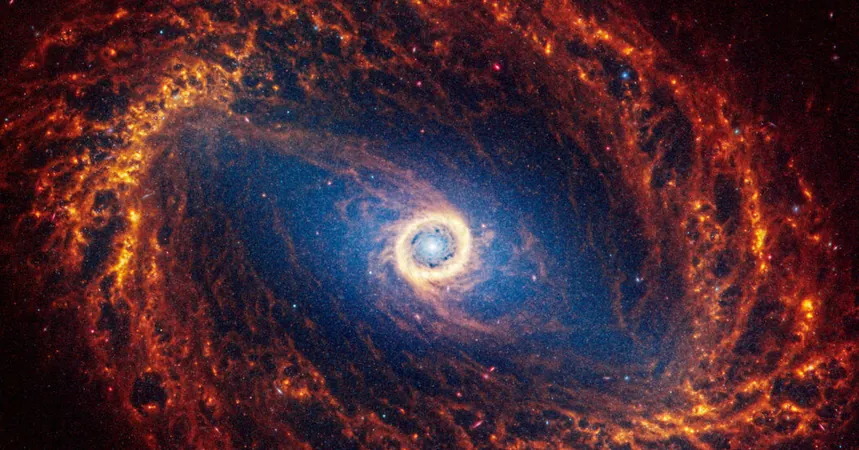
Dive into the Cosmic Race: Musk vs. Bezos and the Future of Space Exploration!
2025-01-01
Author: Lok
Introduction
Elon Musk's SpaceX has firmly established itself as a leader in the modern era of spaceflight, but it seems competition is heating up, particularly from Amazon founder Jeff Bezos and his aerospace company, Blue Origin. With Blue Origin poised to launch its ambitious New Glenn rocket in 2025, the game of cosmic chess may be about to change.
New Glenn vs. Falcon 9
New Glenn, much like SpaceX’s Falcon 9, is engineered for reusability, an exciting innovation that could drastically reduce satellite launch costs. This powerhouse is set to cater to a variety of endeavors — from national security satellites for the U.S. military to lunar landers for NASA. But that’s not all; Bezos is mobilizing his forces to support Amazon’s Project Kuiper, an initiative that aims to establish a vast constellation of satellites to provide global internet coverage, rivalling SpaceX’s Starlink. Interestingly, Amazon is also planning to launch some Kuiper satellites aboard rockets from Blue Origin's key competitors like United Launch Alliance and Arianespace, indicating the fiercely competitive landscape of modern space exploration.
Vera C. Rubin Observatory
Meanwhile, astronomers in central Chile are about to unveil the Vera C. Rubin Observatory, previously dubbed the Large Synoptic Survey Telescope. Set to capture its first light as early as July 4, this cutting-edge facility employs the world's largest digital camera to create a continuous time-lapse of the Southern sky. Anticipated data will be revolutionary, helping scientists probe into the mysteries of dark matter and dark energy — the enigmatic forces that comprise much of our universe yet remain largely undetectable.
U.S. Lunar Exploration and Politics
Unsurprisingly, U.S. lunar exploration is back on the map as policies shift with the upcoming return of Donald Trump to the White House. With Trump’s administration keen on reconsidering NASA’s ongoing lunar projects, including the high-budget Space Launch System (SLS), a pivot towards Mars missions could be on the horizon—aligning closely with Musk’s aspirations. However, significant robotic missions to the moon are still in the works. Early next year, the American firm Firefly Aerospace and Japan's Ispace are set to launch landers on the same Falcon 9 rocket, marking a new chapter in lunar exploration. Following their maiden voyages, Intuitive Machines also plans to deploy a lander, Athena, to explore potential ice samples.
Voyager Missions
Speaking of exploration, let’s not forget the legacy of Voyager 1 and 2, the twin spacecraft launched in 1977 that continue to captivate imaginations. After decades traversing the outer solar system and even sending back the iconic 'Pale Blue Dot' image of Earth, they are now encountering challenges as they drift further into interstellar space. Despite brief communication lapses, NASA remains committed to monitoring these extraordinary probes, which are symbols of human ingenuity and the spirit of exploration.
India's Space Program
Across the world, India’s burgeoning space program is creating waves. With a successful lunar landing and a Mars orbiter under its belt, India is now gearing up for human spaceflight. In the spring, astronaut Shubhanshu Shukla is slated to spend 14 days aboard the International Space Station, marking a significant step for the Indian space community. India’s Gaganyaan project is also making strides towards a crewed mission, with test launches anticipated by 2026.
The Future of SpaceX and Other Players
Lastly, the buzz around SpaceX is palpable as they plan to conduct up to 25 Starship launches by 2025. With the aim of landing astronauts back on the moon, the company continues to showcase the jaw-dropping “chopsticks” catch of its booster, a feat that’ll redefine space operations. Alongside them, Rocket Lab’s development of the reusable Neutron rocket could further diversify the landscape.
Conclusion
As we stand on the brink of a new era in space exploration, the race isn’t just about reaching new heights; it’s a battle of innovation, ambition, and the desire to understand our universe better. Buckle up for an exhilarating ride—this is only the beginning!


 Brasil (PT)
Brasil (PT)
 Canada (EN)
Canada (EN)
 Chile (ES)
Chile (ES)
 Česko (CS)
Česko (CS)
 대한민국 (KO)
대한민국 (KO)
 España (ES)
España (ES)
 France (FR)
France (FR)
 Hong Kong (EN)
Hong Kong (EN)
 Italia (IT)
Italia (IT)
 日本 (JA)
日本 (JA)
 Magyarország (HU)
Magyarország (HU)
 Norge (NO)
Norge (NO)
 Polska (PL)
Polska (PL)
 Schweiz (DE)
Schweiz (DE)
 Singapore (EN)
Singapore (EN)
 Sverige (SV)
Sverige (SV)
 Suomi (FI)
Suomi (FI)
 Türkiye (TR)
Türkiye (TR)
 الإمارات العربية المتحدة (AR)
الإمارات العربية المتحدة (AR)